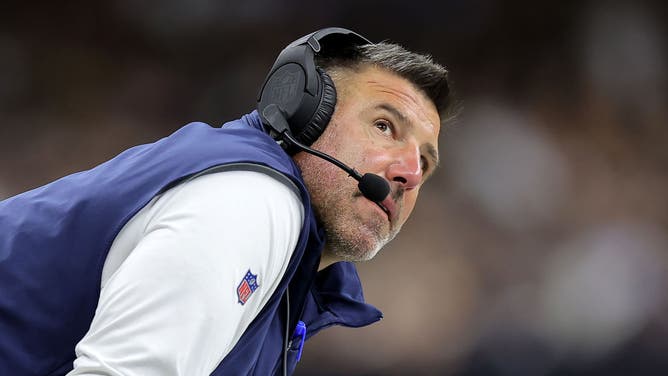Mike Vrabel Defends Titans Decision To Kick Field Goal Down Four Points Late In Loss To Saints
One of the most curious decisions of the first NFL Sunday came from Tennessee Titans head coach Mike Vrabel. With his team trailing the New Orleans Saints by four points and just over two minutes left, Vrabel sent his field goal team out on fourth-and-six from the Saints 11-yard line
The Titans had all three timeouts and decided that cutting the deficit to one point was better than going for the go-ahead touchdown. Nick Folk converted the 29-yard field goal to make the score 16-15 in favor of New Orleans.
The Titans then elected not to onside kick and instead sent the ball deep to the Saints return team. New Orleans ran out the clock and the Titans offense never saw the field again.
The decision raised eyebrows across the NFL. Not from people like me who bet the Titans +3 because I loved the field goal decision.
Though, if you wanted the Titans to actually win the game, a field goal attempt in that situation was, let's say, suboptimal.
Of course, the analytics community hated it. But so did anyone with a rational brain.
Let's break down Vrabel's commentary and how it makes absolutely no sense.
Titans head coach Mike Vrabel says "points were hard to come by" as partial defense for field goal attempt against Saints
Let me get this straight: points are hard to come by therefore the correct decision is take three points knowing that you still need ... more points? The Titans offense struggled to get the ball into New Orleans territory all game.
So the best strategy was to kick a field goal and attempt to get back in Saints territory again? Except with no timeouts and limited time remaining?
That's completely irrational thinking. Plus, the best strategy is pretty much always to keep the game in your own hands. By kicking the ball back to the Saints, the Titans took the result out of their own hands.
Though, Mike Vrabel didn't see it that way.
Vrabel says he "thought the best way to win the game was to play defense, stop them"
OK, let's just say that's true. It still doesn't account for the actual error in decision-making. If Vrabel was confident that his defense could get a stop, then why not go for it? If they fail on fourth down, they still need to get a stop on defense and then score a touchdown to win.
That's one of the biggest misconceptions about fourth-down attempts. Inevitably, the NFL commenter says something like "I guess the coach doesn't trust his defense" when the offense stays on the field for fourth-down.
But that's completely opposite to what actually takes place. In fact, the head coach is saying "Even if we don't get this fourth down, I trust my defense SO MUCH that I'm willing to give their offense a short field."

Tennessee Titans coach Mike Vrabel tried to explain his terrible decision to kick a field goal late in loss against the New Orleans Saints. (Photo by Jonathan Bachman/Getty Images)
Going for a fourth down sends a message to both the offense and defense that the head coach trusts you to make a play. They trust the offense to get the first down. If not, they trust the defense to come up with a stop.
Punting, especially, says "I don't trust either unit." Field goals create a little bit more of a gray area since those actually put points on the scoreboard.
Still, Mike Vrabel's decision to kick that field goal was terrible. The Titans didn't lose the game just because of that one decision.
But it certainly didn't help them win.